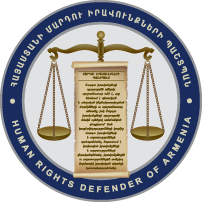FAQ
The Human Rights Defender is an independent official, who shall follow the respect for human rights and freedoms by state and local self-government bodies and officials, and shall facilitate the restoration of violated rights and the improvement of the legislation related to human rights and freedoms.
- Any individual, regardless of ethnic origin, citizenship, place of residence, sex, race, age, political or other affiliation and activity,
- people who have been arrested, are in preliminary detention or convicted persons, as well as persons in other places of detention,
- legal entities,
- trusteeship and custodianship bodies,
- public officials in case of violations of their human rights, but only as individuals and not in their official capacity.
Only authorized representatives of those persons whose rights have been violated can apply to the Human Rights Defender, as well as the members of a deceased person’s family and his/her heirs.
Natural and legal persons may apply to the Defender by submitting a complaint either by post or personally to the Defender or the representative thereof. It is also possible to apply to the Defender with an oral complaint, which shall be reduced to writing by the Defender or the representative thereof.
Natural and legal persons may apply to the Defender both personally and through their representatives.
Complaint to the Human Rights Defender, from initial application through completion of the case, are free of charge.
The services of the Human Rights Defender, from initial application through completion of the case, are free of charge.
The Human Rights Defender does not consider the complaints that:
- must be resolved only by court procedure,
- concern the violations of human rights as a result of actions of non-governmental bodies and organizations,
- were submitted one year after the day when the applicant learnt or should have learnt about the violation of his/her rights,
- according to the Human Rights Defender are not indicative of violation of human rights and fundamental freedoms,
- are anonymous or do not contain the applicant's name, surname, place of residence (address), phone number or the name of the legal entity, legal-and-organizational form and address,
- do not contain a requirement.
The Human Rights Defender terminates the consideration of a complaint if after commencing the discussion the interested person files a claim or an appeal with the court.
After investigating the complaint and identifying violations of human rights and freedoms, the Human Rights Defender, after determining that a violation occurred, recommends to the state and local governmental institutions, and their officials who committed the violation, to eliminate that course of action which brought about the complaint.
The Human Rights Defender also proposes possible arrangements which will restore the violated party’s human rights and fundamental freedoms.
The Human Rights Defender has the power to recommend to the various authorized state bodies to levy disciplinary or administrative sanctions, or to file criminal charges against the public official for his/her decisions, actions or lack of action which resulted in a violation. The Defender has various other means of restoration as prescribed by law.
Interference with the Human Rights Defender’s activity, intimidating the Human Rights Defender, and, among others, insulting the Human Rights Defender is prohibited by law.
The reception of citizens is made by the Human Rights Defender, as well as members of his staff.
Before organizing the reception of a citizen by the Human Rights Defender, on the Defender’s recommendation the reception is organized by the head of the relevant Staff division that ensures the procedure of discussing the complaint.
Based on the circumstances of the particular case the head of the division decides how to organize the citizen’s reception by the Human Rights Defender.


